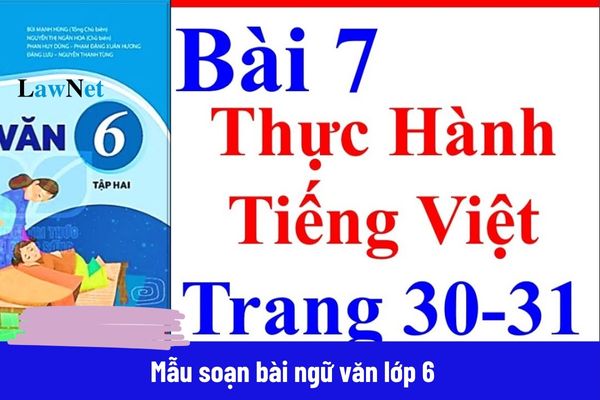What is the guidance for preparing the lesson regarding Vietnamese Language Practice in the 6th-grade Literature? What are the perspectives on developing the Literature curriculum?
What is the guidance for preparing the lesson regarding Vietnamese Language Practice in the 6th-grade Literature?
Below is a sample lesson regarding Vietnamese Language Practice in the 6th-grade Literature:
| Question 1, page 30, 6th-grade Literature Textbook: - Gia tien (Ancestors): Gia – house; tien – prior, earliest → Ancestors of the family. - Gia truyen (Family Tradition): Gia – house; truyen – pass on, transmit → Passed down through generations in a family. - Gia canh (Family Situation): Gia – house; canh – visible state, situation → Circumstances of a family. - Gia san (Family Property): Gia – house; san – assets → Assets of a family. - Gia suc (Livestock): Gia – domestic animals; suc – animals like buffalo, cow, goat, dog,... → Domestic animals. Doc gia: reader - Tac gia: person who creates a work, poetic product, etc. Ki gia: journalist. Compound words and reduplicative words Question 2, pages 30-31, 6th-grade Literature Textbook: a. hient nguyen hinh: revert to original form. b. vu va: falsely accuse someone of a crime they did not commit. c. rong luong: open-hearted, forgiving, empathetic towards others' mistakes and faults. d. bun run: unable to move as if muscles are completely relaxed. Question 3, page 31, 6th-grade Literature Textbook: a. khoe nhu voi: very strong, unusually strong lan la: gradually approach someone ga: invite, lure someone to do something b. hi hung: overly joyous c. khoi ngo tuan tu: handsome, intelligent appearance d. bat hanh: unfortunate, suffer due to bad luck buon ruoi rui: very sad, quietly sad Rhetorical devices Question 4, page 31, 6th-grade Literature Textbook: - Thach Sanh's rice pot never depletes, symbolizing an unlimited supply. - Some other idioms: Thach Sùng is still missing a shard (story of Thach Sùng), gentle as co Tam (story of Tam Cam),... |
Note: The sample lesson regarding Vietnamese Language Practice in the 6th-grade Literature is for reference only.

What is the guidance for preparing the lesson regarding Vietnamese Language Practice in the 6th-grade Literature? What are the perspectives on developing the Literature curriculum? (Image from the Internet)
What are the perspectives on developing the Literature curriculum in Vietnam?
According to the General Education Program for Literature issued with Circular 32/2018/TT-BGDDT, perspectives on developing the Literature curriculum in Vietnam are as follows:
The Literature curriculum adheres to the basic regulations stated in the General Program while emphasizing several perspectives:
- The Literature curriculum is developed on theoretical and practical foundations, updates on research achievements in education, psychology, and teaching methodology of Vietnamese literature; achievements in literature and linguistics research; achievements in Vietnamese literature across various periods; experiences in developing Vietnamese literature curricula, particularly from the early 21st century until now, and international trends in curriculum development in general, and the Literature curriculum in particular over recent years, especially from developed countries; societal practice, education, economic conditions, and Vietnamese cultural tradition, especially the diversity of students in terms of regions, conditions, and learning abilities.
- The Literature curriculum focuses on training communication skills (reading, writing, speaking, and listening) as a central theme throughout all three education levels to meet the program's capacity-oriented direction and ensure coherence and continuity across all grades and levels. Fundamental, foundational knowledge about the Vietnamese language and literature is formed through activities in comprehending and creating texts; directly serving the requirement of training in reading, writing, speaking, and listening skills.
- The Literature curriculum is developed with an open approach, reflected in not specifying detailed teaching content but stipulating the outcomes needed in reading, writing, speaking, and listening for each grade; delineating some basic, core knowledge about the Vietnamese language, literature, and some texts with a significant, crucial position in national literature as mandatory content for students nationwide.
- The Literature curriculum meets both the innovation requirements and emphasizes inheriting and enhancing the strengths of existing Vietnamese literature curricula, especially the current one.
What are the goals of education in Vietnam?
According to Article 2 of the Education Law 2019, the specific regulations on the goals of education are as follows:
The goals of education are to educate the Vietnamese into comprehensively developed persons who possess ethics, knowledge, education, physical health, aesthetic sense and profession; to shape and cultivate one's dignity, civic qualifications and competence; to nurture one’s patriotism, national spirit, loyalty to the ideology of national independence and socialism; to develop potentials, the creativity of each individual; to improve the people’s knowledge and manpower, to foster talents, satisfying the demands of the construction and defense of the Fatherland and international integration.

